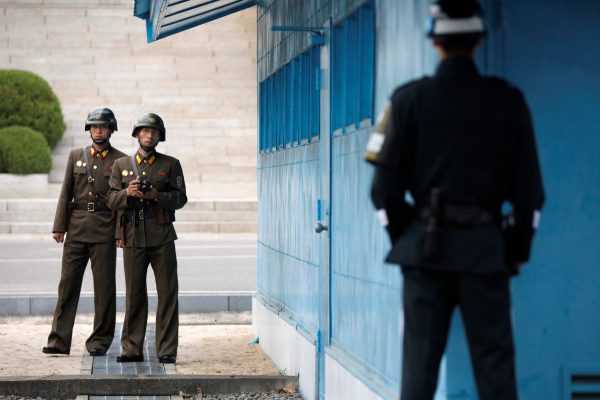President Moon’s statements signify that some of his earlier campaign promises, which focused on unconditional engagement with North Korea, were toned down. Still, Moon’s continued emphasis on dialogue indicates that he seems to favour cooperation over confrontation, and if conditions permit, he may consider adopting some adapted version of his liberal predecessors’ Sunshine Policy.
In South Korean politics, liberal political parties often support a policy of engagement with North Korea. This is because left-wing politicians tend to value minjok (the Korean race) over the North–South ideological and political divide. In a broader sense, liberals embrace ethno-nationalism — the notion that sharing the same bloodline is superior to temporary national partition. Conservatives on the other hand support regime-based nationalism, which puts emphasis on being South Korean and stresses the differences in social and political values between the two Koreas.
Presidents Kim Dae-jung and Roh Moo-hyun thought that with their Sunshine Policy they could change North Korea from the inside — the policy would expose their northern neighbour to a different way of life and a better economic system. Moreover, helping people of the same minjok would not only be moral but also beneficial in the long term for the entire Korean race.
North Korea benefited tremendously from South Korean investments such as the Kaesong Industrial Complex, Mount Kumgang Resort Complex and inter-Korean transportation projects. This gave Pyongyang time to partially recover from the collapse of the Soviet Bloc. Further, the two South Korean presidents even succeeded in having summits with Kim Jong-il to improve mutual understanding and solidify the gains from joint Korean endeavours.
Unfortunately, the Sunshine Policy did little to persuade North Korea to launch basic economic reforms, and it even failed to prevent it from carrying out a nuclear test. In short, engagement did not achieve the intended goals of reforming the economy, halting Pyongyang’s nuclear developments or restructuring North Korea’s political system.
But if President Moon is determined to champion his predecessors’ approach, he will likely invest his political capital into another unsuccessful round of tit-for-tat negotiation. Moon’s ‘Sunshine Policy 2.0’ will not be as revolutionary and unconditional as that of Kim and Roh given Pyongyang’s recent preponderance of provocations. Nonetheless, Moon’s policy is clearly influenced by his predecessors’ legacy, hence his many proposals to restart dialogue with Pyongyang as well as his pledge to reopen the Kaesong Industrial Complex as incentives for denuclearisation.
But even if North Korea agrees to temporarily freeze its nuclear program in exchange for Moon’s promised economic assistance, Seoul and Washington should not be hopeful that Pyongyang would honour such a deal in the long run. North Korea’s violations of the 1994 Agreed Framework, Six-Party Talks Joint Statements and the 2012 Leap Day deal have tarnished its image as a reliable partner. If North Korea was not willing to denuclearise when its nuclear arsenal was primitive, there is even less reason to believe that it will abide by another deal now.
More importantly, reopening the Kaesong Industrial Complex, resuming humanitarian aid and supporting limited economic exchanges may damage the international community’s efforts in punishing Pyongyang for its missile tests. Common North Koreans have not historically benefited from South Korean humanitarian and economic support, since Pyongyang largely channelled the workers’ payments to other state projects or distributed aid according to the songbun system under which the North Korean government assigns a status to all citizens at birth based on the perceived political loyalty of his or her family going back generations.
Further, Seoul’s promise of financial assistance in exchange for North Korea’s economic liberalisation and denuclearisation is simply not enough to incentivise North Korea to risk political instability and undertake major changes in its national policies. Moon’s Sunshine Policy 2.0, if welcomed by Pyongyang, would at best temporarily halt inter-Korean tension and delay the nuclear issue until a further date. The root cause of the nuclear program is not Pyongyang’s low level of economic development but rather the imbalance of power on the Korean Peninsula.
Rewarding North Korea’s bad behaviour with lucrative North–South projects is not smart foreign policy. Given Pyongyang’s repeated violations of international sanctions and agreements, South Korea needs to refrain from giving the North any economic benefits — which Pyongyang might potentially use to fund weapons of mass destruction — until it looks like it is willing to credibly come to the table.
Seoul should instead invest its resources in denying North Korea’s access to foreign currency, raising the issue of its human rights violations at international summits, pressuring China and its businesses to enforce United Nations punishments and enhancing its military coalition with the United States and Japan. Effective sanctions and pressure in order to build a foundation for the possibility of credible negotiations will take time and effort and South Korea needs to maintain a cool head when it comes to denuclearising North Korea.
Khang Vu is a graduate student at Dartmouth College.

